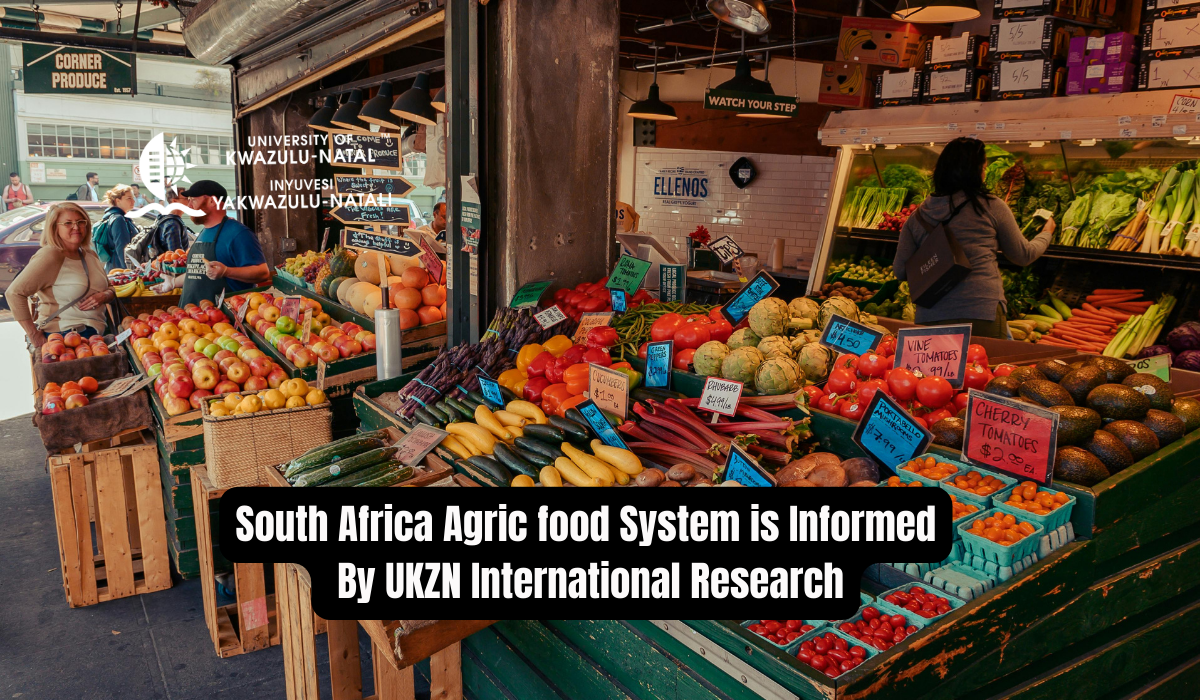UKZN Guide
South Africa Agric food System is Informed By UKZN International Research

South Africa Agric food System is Informed By UKZN International Research. the University of KwaZulu-Natal (UKZN) is playing a pivotal role in shaping policy. This research, spearheaded by the Sustainable and Healthy Food Systems (SHEFS) programme, supported by the Wellcome Trust’s Our Planet, Our Health Programme, is aimed at fostering a more diverse agrifood ecosystem by advocating for the integration of neglected and underutilized crop species.
Read Also: UKZN Status Check Online
Shaping Policy for a Sustainable Future
Years of dedicated work by researchers affiliated with SHEFS have underscored the critical intersection of environment, food systems, and health. The pressure on food systems emanates from multifaceted stressors such as demographic shifts, changing dietary patterns, and rapid urbanization. These factors not only contribute to undernourishment and the prevalence of non-communicable diseases but also lead to economic losses and environmental degradation.
A consortium of researchers from the UK, South Africa, and Botswana has outlined the pressing challenge posed by escalating food demand. This demand exacerbates existing inequities in household food security, further straining food systems already vulnerable to climate change and environmental degradation.
Diversifying Food Systems for Resilience
Professor Tafadzwa Mabhaudhi, leading the agriculture theme of SHEFS, emphasizes the importance of diversifying food systems with underutilized crops. Such diversification not only boosts agricultural income but also fosters agrobiodiversity, ensuring a steady supply of diverse and nutritious food. This approach holds promise in addressing malnutrition, hidden hunger, and food insecurity amidst climate change.
The advocated mainstreaming of underutilized crops is not merely about food production but also about empowering vulnerable communities economically and sustainably. By transforming the food system into a more inclusive and resilient one, it promises to uplift marginalized groups, including women and youth, particularly in rural areas.
Pathways to Transformation
The transition towards integrating underutilized crops into mainstream food systems necessitates a comprehensive framework of action and collaboration. This includes policy harmonization, crop improvement, inclusive value chains, access to finance, and capacity building. Challenges in adoption and mainstreaming, such as seed systems and marketing, must be addressed to unlock the full potential of these crops.
Underutilized crops exhibit remarkable resilience to climate change, making them invaluable assets in bolstering food systems’ adaptability. Their nutrient-density and adaptability to harsh environments make them pivotal in promoting healthier, more equitable diets.
A Call to Action
As we stand at a critical juncture, concerted efforts are required to drive meaningful change. A new initiative focused on transdisciplinary research is imperative, integrating the most promising underutilized crops, approaches, and technologies. Collaboration among diverse stakeholders, including academic institutions, governmental bodies, and research organizations, is essential to realize the vision of a more resilient and sustainable agrifood system in South Africa.
Conclusion
The collaborative efforts led by UKZN SHEFS programme underscore the imperative of integrating underutilized crops into South Africa’s agrifood system. By advocating for policy changes and fostering collaborative partnerships, this research aims to catalyze a transformation towards a more diverse, resilient, and equitable food system, ensuring the well-being of both people and the environment.
-

 UKZN Application8 months ago
UKZN Application8 months agoUKZN Application Pending Status Check
-

 UKZN Application8 months ago
UKZN Application8 months agoUKZN Application Status Check 2024/25 Complete Process
-

 UKZN Application6 months ago
UKZN Application6 months agoBridging Courses 2024-2025 at UKZN
-

 UKZN Application8 months ago
UKZN Application8 months agoUKZN Status Check and Accept Offer Complete Guide
-

 UKZN Application8 months ago
UKZN Application8 months agoUKZN Application Dates For 2023/24 Complete Guide
-

 UKZN Application8 months ago
UKZN Application8 months agoUKZN Late Application Status Check – A Comprehensive Guide
-

 UKZN Application6 months ago
UKZN Application6 months agoUniversity of Kwazulu-Natal (UKZN) Prospectus 2023/2024
-

 UKZN Guide8 months ago
UKZN Guide8 months agoUKZN Student Central Step-by-Step Guide










